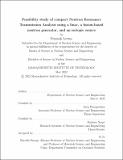| dc.contributor.advisor | Danagoulian, Areg | |
| dc.contributor.author | Levine, Peninah | |
| dc.date.accessioned | 2022-08-29T16:05:12Z | |
| dc.date.available | 2022-08-29T16:05:12Z | |
| dc.date.issued | 2022-05 | |
| dc.date.submitted | 2022-06-17T16:14:40.855Z | |
| dc.identifier.uri | https://hdl.handle.net/1721.1/144692 | |
| dc.description.abstract | Various nuclear security applications such as fuel enrichment analysis and warhead verification seek to identify nuclear materials in a black box target. Neutron Resonance Transmission Analysis (NRTA) is a spectroscopic technique which uses resonant neutron absorption to identify isotopic compositions. Previous NRTA experiments have used expensive beam line facilities with kilometer-long accelerators. This work explores feasibility of compact NRTA configurations using a linear accelerator (linac), fusion-based neutron generator, and isotopic source. Monte Carlo simulations show that these configurations trade off between complexity and flux, which is related to measurement time. A 5.5 MeV linac may yield the highest epithermal (1-10 eV) neutron flux (10⁷ neutrons s⁻¹), but conversion of electrons to neutrons adds complexity, bulk, and expense. A deuterium-tritium (DT) fusion-based neutron generator produces a moderate neutron flux (10⁶ neutrons/s) and complexity relative to the linac and isotopic configurations. Isotopic NRTA may provide the simplest solution but limits flux to 10⁴ neutrons s⁻¹. Preliminary isotopic experiments indicate that limited source activity poses a challenge for overcoming gamma background. This thesis discusses feasibility of each proposed NRTA setup in various security applications. | |
| dc.publisher | Massachusetts Institute of Technology | |
| dc.rights | In Copyright - Educational Use Permitted | |
| dc.rights | Copyright MIT | |
| dc.rights.uri | http://rightsstatements.org/page/InC-EDU/1.0/ | |
| dc.title | Feasibility study of compact Neutron Resonance Transmission Analysis using a linac, a fusion-based neutron generator, and an isotopic source | |
| dc.type | Thesis | |
| dc.description.degree | S.B. | |
| dc.description.degree | S.M. | |
| dc.contributor.department | Massachusetts Institute of Technology. Department of Nuclear Science and Engineering | |
| mit.thesis.degree | Bachelor | |
| mit.thesis.degree | Master | |
| thesis.degree.name | Bachelor of Science in Nuclear Science and Engineering | |
| thesis.degree.name | Master of Science in Nuclear Science and Engineering | |
